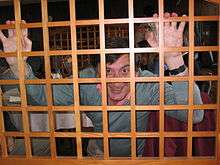Gordon Plotkin
| Gordon Plotkin | |
|---|---|
 At the MFCS 2005 conference | |
| Born |
Gordon David Plotkin 9 September 1946[1] Glasgow |
| Residence | Scotland |
| Nationality | British |
| Alma mater |
University of Glasgow (BSc) University of Edinburgh (PhD) |
| Known for |
Programming Computable Functions Unbounded nondeterminism Operational semantics Domain theory |
| Awards | |
| Scientific career | |
| Fields |
Logic Computer science Mathematics |
| Institutions |
University of Edinburgh Laboratory for Foundations of Computer Science School of Informatics University of Glasgow |
| Thesis | Automatic methods of inductive inference (1972) |
| Doctoral advisor | |
| Doctoral students | |
| Website |
homepages inf |
Gordon David Plotkin, FRS, FRSE (born 9 September 1946) is a theoretical computer scientist in the School of Informatics at the University of Edinburgh. Plotkin is probably best known for his introduction of structural operational semantics (SOS) and his work on denotational semantics. In particular, his notes on A Structural Approach to Operational Semantics were very influential. He has contributed to many other areas of computer science.[8][9][10][11][12][13][14]
Education
Plotkin was educated at the University of Glasgow and the University of Edinburgh, gaining his Bachelor of Science degree in 1967[1] and PhD in 1972[4] supervised by Rod Burstall.[3]
Career
Plotkin has remained at Edinburgh, and was, with Burstall and Robin Milner, a co-founder of the Laboratory for Foundations of Computer Science (LFCS).[15][16][17][18]
Awards and honours
Plotkin was elected a Fellow of the Royal Society in 1992, is a Fellow of the Royal Society of Edinburgh and a Member of the Academia Europæa. He is also a winner of the Royal Society Wolfson Research Merit Award. Plotkin received the 2012 Royal Society Milner Award for "his fundamental research into programming semantics with lasting impact on both the principles and design of programming languages."[19]
His nomination for the Royal Society reads:
| “ | Plotkin has contributed to Artificial Intelligence, Logic, Linguistics and especially to Computer Science. In AI he worked on hypothesis-formation and universal unification; in Logic, on frameworks for arbitrary logics; in Linguistics, on formalising situation theory.
His main general contribution has been to establish a semantic framework for Computer Science, especially programming languages. Particular significant results are in the lambda-calculus (elementary models, definability, call-by-value), non-determinism (powerdomain theory), semantic formalisms (structured operational semantics, metalanguages), and categories of semantic domains (coherent, pro-finite, concrete). Further contributions concern the semantic paradigm of full abstraction, concurrency theory (event structures), programming logic and type theory.[2] |
” |
References
- 1 2 "PLOTKIN, Prof. Gordon David". Who's Who 2013, A & C Black, an imprint of Bloomsbury Publishing plc, 2013; online edn, Oxford University Press. (subscription required)
- 1 2 "EC/1992/29: Plotkin, Gordon David". London: The Royal Society. Archived from the original on 16 April 2014.
- 1 2 Gordon Plotkin at the Mathematics Genealogy Project
- 1 2 Plotkin, Gordon David (1972). Automatic methods of inductive inference (PhD thesis). University of Edinburgh.
- ↑ Cardelli, Luca (1982). An algebraic approach to hardware description and verification (PhD thesis). University of Edinburgh.
- ↑ Moggi, Eugenio (1999). The partial lambda calculus (PhD thesis). University of Edinburgh.
- ↑ Wèi, Lǐ (1983). An operational approach to semantics and translation for programming languages (PhD thesis).
- ↑ Gordon Plotkin publications indexed by Google Scholar
- ↑ Gordon Plotkin author profile page at the ACM Digital Library
- ↑ Gordon Plotkin's publications indexed by the Scopus bibliographic database. (subscription required)
- ↑ Gordon D. Plotkin at DBLP Bibliography Server

- ↑ Mitchell, J. C.; Plotkin, G. D. (1988). "Abstract types have existential type". ACM Transactions on Programming Languages and Systems. 10 (3): 470. doi:10.1145/44501.45065.
- ↑ Abadi, M. N.; Burrows, M.; Lampson, B.; Plotkin, G. (1993). "A calculus for access control in distributed systems" (PDF). ACM Transactions on Programming Languages and Systems. 15 (4): 706. doi:10.1145/155183.155225.
- ↑ List of publications from Microsoft Academic
- ↑ Plotkin, G. D. (1975). "Call-by-name, call-by-value and the λ-calculus". Theoretical Computer Science. 1 (2): 125. doi:10.1016/0304-3975(75)90017-1.
- ↑ Plotkin, G. D. (2004). "The origins of structural operational semantics". The Journal of Logic and Algebraic Programming. 60-61: 3. doi:10.1016/j.jlap.2004.03.009.
- ↑ A Structural Approach to Operational Semantics by G.D. Plotkin (1981)
- ↑ Program Verification and Semantics: Further Work Archived 26 September 2007 at the Wayback Machine. (2004)
- ↑ Royal Society Milner Award